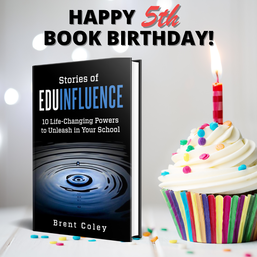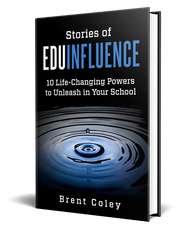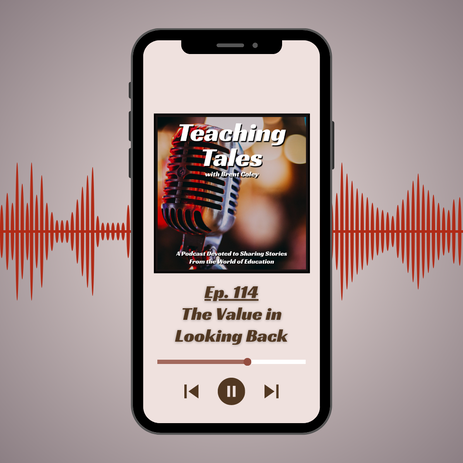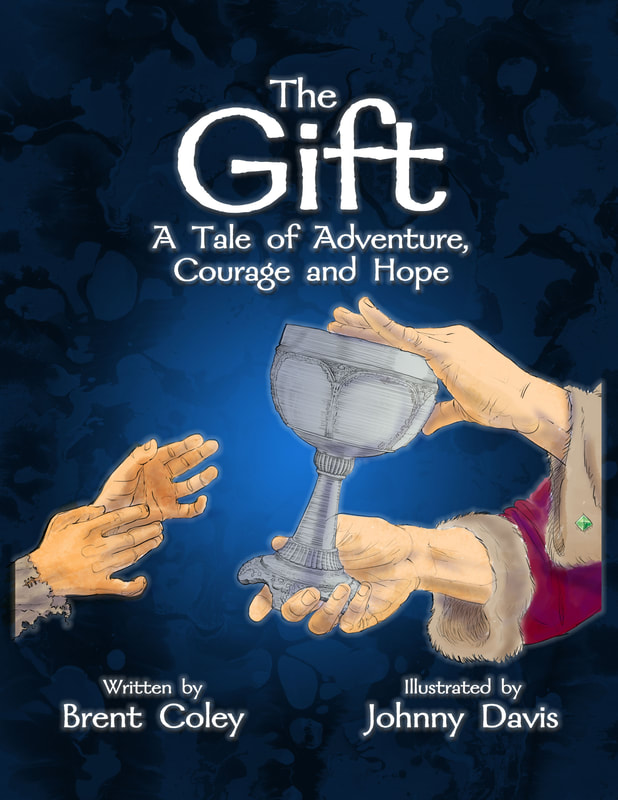 The school year is winding down, summer is almost upon us, and I’ve got some exciting news to share. I’m thrilled to let everyone know that The Gift, my illustrated children’s book, is now available in a digital Kindle edition! I released the book in paperback almost two years ago, and because the illustrations by Johnny Davis look so fantastic in print, I didn’t pursue creating an eBook version. But in a world where readers now have the choice of consuming practically all their text not only in print but on their phones, iPads/tablets, or eReaders, I thought to myself Why not? And so, the Kindle version of The Gift was born. Now you can join Quinn on his journey using your mobile devices, delighting in the world-class illustrations while enjoying the ability to adjust the font size...for only $4.99! If you’re not sure what the book is about, here’s the excerpt from the back cover: For twelve-year-old orphan Quinn, life has been one heartbreak after another. But when an unexpected visitor arrives in his village, his life is about to change. Join Quinn on an adventure that will test his courage and faith, a journey proving that good things come to those who persevere.  And more good news! If you’re someone who enjoys listening to books on Audible, the audio version of The Gift is coming soon! I’m in the process of recording the book (I’m narrating it myself) and am planning for a summer release. This could be great for teachers to play in their classrooms or kids to listen to at home while following along with a physical or digital copy. Stay tuned for more details! If you don’t yet have a copy of the paperback edition, grab one today. Prefer a digital version? I’ve now got you covered. Already have the paperback but want to add the Kindle version to your digital library? Well, that would just make me smile. :) Finally, if you’ve already read The Gift and enjoyed it, would you consider leaving a review on Amazon? I’m told more reviews help with the algorithm, making the book more visible to potential readers. Telling a friend about the book would make me smile as well. Thank you for all your support! Happy reading!
0 Comments
 When I taught 5th grade, I borrowed an idea from U.S. History teacher Eric Langhorst and began recording audio review sessions for my students to help them review for Social Studies and Science tests. I called them StudyCasts. The goal was not to replace traditional studying but rather provide my students with another method of studying, a method that may be a little more agreeable to them when compared to solely poring over their notes. I figured, if students are always on their computers or iPods (yes, that says iPod -- this was 14 years ago), why not turn those devices into study tools? If you can't beat 'em, join 'em, right? Wondering what a broadcast sounded like? Here's the episode I recorded to help students prepare for their first geography quiz that year. I've always believed that in addition to so many other benefits, technology has the "cool" factor, something that can't be underestimated with it comes to using tech with students. By taking the content I was teaching and putting it into a format that was easily accessible for students, my hope was they would be more likely to engage with the material outside of the classroom. If I made studying cool, maybe they'd be more likely to do it. Did all of my students listen to StudyCasts? No, not all of them. But many did. And when I asked my class what they thought of StudyCasts, here's what one student said: "I listened to the Puritan StudyCast five times and got a good grade on the test.” Five times. How often do students look over their traditional notes five times to study for a test? I don't have any official statistics, but I don't think the occurrence percentage is very high. While recording StudyCasts is something I did nearly a decade and a half ago, I believe the concept is still relevant today (perhaps even more relevant, given the fact that so many students in the late elementary grades and above have their own phones). And with the advances in technology, the ability to create and share these audio recordings has become ridiculously simple. If this sounds like something you'd like to try in your own classroom, check out my brand new 4-part video series where I walk viewers through how to easily create their own StudyCasts. All four videos total just over 25 minutes, so in less than half an hour, you'll be ready to start recording and sharing broadcasts for your students! You can check out a short teaser below, and to access the FREE video series, click on the image below the teaser. Happy viewing and recording!  I just realized my book Stories of EduInfluence celebrated its 5th birthday earlier this month. Hard to believe it's been five years since it was released to the world. I didn't write it to get rich...which is good, because that hasn't happened. :) I wrote it to encourage educators by sharing stories from my experience as a teacher and site administrator. For those who have purchased and read the book, thank you. Sincerely. I pray it has reminded you of the life-changing impact you have on those you serve, regardless of your position. If it has, would you consider leaving a review on Amazon? I've been told more reviews help make the book more visible to potential readers, to folks who could use the encouragement the book offers. If you haven't yet picked up a copy and are in the market for some encouragement in the form of stories, now's a good time. The paperback and Kindle versions are both on sale (currently $11.03 and $5.02 respectively). It's also available as an Audible audiobook (I narrated it myself). You can purchase here . And to my family and friends who have supported me throughout my journey as an author, thank you. You are loved and appreciated. - Brent  My blog is not typically a place for personal posts, but a lot has been going on the past few months. In late November, I visited the dermatologist to have a suspicious spot on my left shoulder looked at. Upon seeing it, the dermatologist was very concerned it may be melanoma and decided to biopsy the area that day. He sent the biopsy to be tested to 1) determine if it was melanoma and 2) if it was, if it was deep and had potentially spread to my lymph nodes. So we prayed. Two weeks later I received a call with good and bad news. The bad news was that it was indeed melanoma. The good news was it didn’t not appear to be deep into the dermis. I was told the next step would be for a surgeon to go in and get the margins – essentially cut out a larger area to make sure they got all the cancerous tissue. So we continued to pray. In January, Jill and I met with the surgeon for a consultation. In addition to the surgeon taking the margins in my shoulder, his plan was to also identify the lymph node connected to that area of my shoulder and remove it. While he said there was only a 1 in 10 chance that the cancer had spread to the lymph node, removing and testing the node would help determine the plan moving forward. If the node was clean, they’d know they got all the bad stuff and I’d be good to go. If the melanoma had traveled to the lymph node, then they could start me on treatment. But this way we’d know one way or the other. Next up was waiting for the next available date to perform the surgery. My case was prioritized, but we weren’t sure how soon they’d be able to get me in. So we waited and continued to pray. On Tuesday, February 13, I received a call saying they had a cancellation and could do the survey two days later (February 15). To celebrate Valentine's Day, I got bloodwork and an EKG since the procedure the next day was going to require general anesthesia. Then on Thursday, Jill and I drove up to Kaiser Riverside for the big day. After Radiology determined the connected lymph node was located near my left clavicle (about 4-5 inches from the biopsied area), they prepped me for surgery and rolled me into the O.R. A couple hours later, I woke up with 11 staples in my shoulder, a few sutures near my clavicle, and one less lymph node. The procedure went well, with the surgeon able to remove all the affected tissue and the lymph node. I was told that the node would be sent for testing and I’d receive the results in about a week. Once again, we waited. And prayed. Lots and lots of praying. At a little after 5:00 p.m. on Monday, February 19, I received an email letting me know I had a message from the surgeon waiting for me on kp.org. With my heart beating out of my chest, I sat down at my computer, knowing the next few moments could potentially change the trajectory of my life. After navigating to my message Inbox, I was greeted with the following words: “No spread of melanoma to the lymph node.” It’s not often an email or text message causes you to burst into tears, but this was one of them. Never before in my life had I felt such relief, and I spent the next hour or so calling and texting family and close friends to share the good news.
God is good. But if things had turned out differently, He would still be good. The past three months have been some of the most emotionally exhausting of my life. But through all of it, I knew that I was in the hand of the Most High. His goodness and sovereignty are not dependent on Him answering my prayers. But I’m so, so thankful He did. For those who have been praying for my situation, thank you. Know that I felt your prayers. A colleague told me last week that he was impressed at how I had handled the situation. My response? “That’s God. That wasn’t me.” All glory goes to Him. So if you interacted with me over the past few months, asked me how I was doing, and I responded with something like “I’m hanging in there,” now you know why. Because I was struggling. I was just hanging in there. But I was never alone.  "Don't look back." "Focus on the future, since that's where you're going." At some point in your life, you may have received advice such as this, counsel to keep looking forward, to never look back. While we definitely don’t want to live in the past, I'd like to make the case that there can be great value in looking back, if for nothing else than to see how much you've grown. Take a moment and listen to Ep. 114 of my Teaching Tales podcast where I talk about how my daughter's recent college graduation reminded me that we all need to take time to look back to remember and appreciate how far we've come.  In 1996, way back during my first year of teaching, I had the opportunity to attend a presentation by award-winning children’s book author Robert San Souci. Held at a local elementary school, Mr. San Souci spoke about the various illustrated books he’d written, his writing process, and what inspired him to write. Sitting in a folding chair in a crowded multipurpose room that evening, a fire was lit inside of me. I remember walking away from the event thinking I want to do that. I want to write a children’s book. So the next day I sat down at my computer and embarked on a writing journey that, though I didn’t know it at the time, would end up spanning over a quarter century. My goal was to create a fictional adventure for young readers, a story that could one day be published as an illustrated book. I had no idea where it would go, but I decided to just start writing. I was newly married and teaching full-time, so time was at a premium. To say my writing sessions were sporadic would be an understatement. As life happened and my family grew, I’d often go several months if not an entire year or more between sessions. But the fire never went out. It was just a slow burn. After about a decade, I finally had a completed rough draft (emphasis on the word rough). I occasionally revisited the project over the next few years to revise and tweak the story, only to put it back in a digital drawer for later. But the dream of publishing the story was still alive. The fire was still there, if only embers buried beneath the busyness of life. Then last summer I made the decision to seriously pursue publishing the book. I dove back into the story, completing multiple rounds of edits and revisions. Choosing to self-publish, I also needed to find an illustrator who could take the story to the next level through pictures. I prayed to be connected with the right partner for the project, and my prayers were answered in the form of Johnny Davis. For the past year I have worked with this uber-talented friend and artist, and during our virtual meetings it was a joy to see him consistently produce my imagination in his artwork. Folks, his illustrations are going to blow you away. So what’s the book about, Brent? Set in an imaginary land of castles, kings, and queens, it’s the story of Quinn, a twelve-year-old orphan whose life has been one heartbreak after another. But when an unexpected visitor arrives in his village, his life is about to change. It’s a tale of adventure that will test Quinn’s courage and prove that good things come to those who persevere. It’s not a typical picture book where each page contains an illustration and only a sentence or two (e.g. If You Give a Mouse a Cookie), but it’s not quite a full-blown chapter book either (e.g. The Lion, the Witch, and the Wardrobe). Targeting readers ages 8 and up, think of it as a bridge between beginning chapter books like The Magic Treehouse series and young adult chapter books. The book is 8”x10” with full pages of text and full-page illustrations on every second or third page. I’ve also included discussion questions at the end that teachers and parents can use to reinforce the values presented in the story. And... I’m over the moon to announce that it’s finished and now available on Amazon! Click here to order your copy. My dream has come true. It took over 25 years, but it's been realized. I’d love for you to pick up a copy and pray that you and your kids enjoy the story and are encouraged by the message it contains. Below are the front and back cover for you to enjoy!  In our world right now, there’s a lot of attention being paid to protecting ourselves from illness, specifically COVID-19. Yesterday, I experienced something that reminded me that a virus isn’t the only thing that’s contagious. I’ve previously written about the Power of the Little Things, how even the smallest of actions can reap huge dividends for those around us. How a high five, a simple compliment, or something as small as a smile can make someone’s day, week, or even month. Yesterday, I was reminded that exercising the Power of the Little Things can be contagious. Every morning at school, one of my responsibilities and privileges is greeting students and their families as they arrive on campus. As students walk by and get out of their cars, I make it a point to look for small compliments to give. If I see a student walking up in what appears to be a new pair of shoes, I say something like, “Wow! Are those new shoes? Those look great!” If a kindergartener or first grade girl has a bright bow in her hair, I’ll comment on it. “Pretty bow!” If a boy has a stylish shirt or a girl is wearing a pretty dress, I’m sure to mention it to them. Every single day I compliment students in ways like these. Why? Because chances are, they’re dying for someone to notice their new shoes, hair bow, shirt, or dress. Think back to when you were young. Remember when you got that new pair of shoes and wore them to school for the first time? My guess is you hoped someone would mention them. I know I did. And this doesn’t just apply to the early grades of elementary school. Middle and high schoolers crave this attention too, probably even more so. But yesterday I experienced something super cool. As one car drove up before school, I opened the car door and one of our young girls got out. She thanked me and then looked at me, as if searching for something. She looked at my hat, my shirt, and finally her eyes settled on my shoes. “Mr. Coley, I really like your shoes!” she said with a big smile. My shoes. My ordinary shoes. My old, worn, scuffed, and need-to-be-replaced-soon shoes (see below). It was as if she was looking for something to compliment, couldn’t find anything extraordinary, so settled on my shoes. And you know what? I believe that’s exactly what happened. See, this isn’t the first time this has occurred. This is actually the third time this year a student has complimented my shoes. None of those times were my shoes anything special, anything that would have stood out. In fact, all three times I was wearing older, worn shoes. Then why did I receive compliments on them from students? Simple. Because I complimented them first. I’ve modeled the behavior, and I truly believe in this case, they’re now mimicking my actions. The lesson to be learned here? A virus isn’t the only thing that can be spread. Our behavior is contagious. Kindness is contagious. I’ve made it a habit to look for the little things -- shoes, glasses, dresses -- and make a positive comment about them. And now I have students doing the same thing. Looking for something nice to say is on their radar. And if they’re complimenting my old shoes, how often are they doing the same kind of thing with their peers? I’m guessing more than they would have otherwise. If you’re not already doing so, I encourage you to look for those small compliments to give to the students and staff around you. Because not only will it make a difference in the life of the person you encourage, but your action can create a ripple effect that can spread to others. Remember, not everything that’s contagious is bad. We can all be super spreaders...of kindness!  Want to hear more? I devoted an entire chapter of my book Stories of EduInfluence to the topic of how small actions can make a big impact. Click/tap here to listen to the Audible version of “Chapter 8: The Power of the Little Things." If you’d like to purchase a copy of the book in paperback, Kindle, or Audible versions, head over to Amazon. |
About BrentBrent has worked in the field of education as a teacher and administrator for 28 years. A former elementary school teacher and principal, he is currently Coordinator of Elementary Education in the Murrieta Valley Unified School District in Southern California. Read more about Brent here. Brent on X (Twitter)Archives
May 2024
Categories
All
|
Photos from somegeekintn, woodleywonderworks, Joybot, British Council Singapore, jseliger2, berkuspic, toddwendy, Alexandra E Rust, skippyjon, crdotx, tharrin, roybuloy, .FuturePresent., Just some dust, frankpierson, Jair Alcon Photography, Luigi Mengato, Muffet, stevendepolo, Pilar Soro, Sander van der Wel, jblyberg, jonathangarcia, DraXus, angeloangelo, Sthetic







 RSS Feed
RSS Feed
